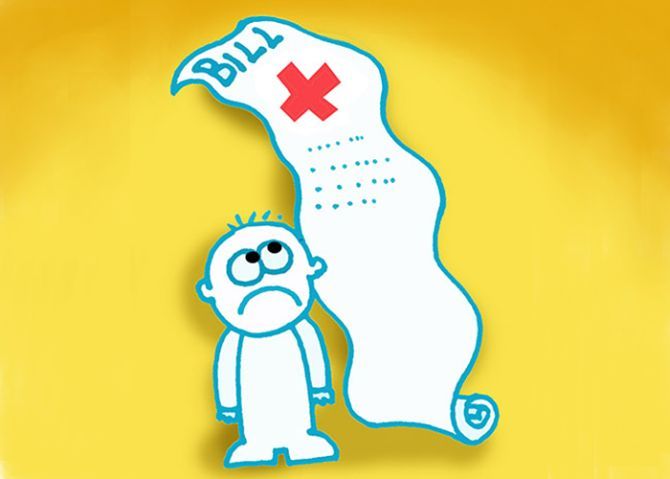Experts believe that states will be in a predicament because of their tight fiscal position and reluctance to replace their own health schemes with this newly announced National Health Protection Scheme.
Illustration: Dominic Xavier/Rediff.com.

Two days after Finance Minister Arun Jaitley announced the world’s so-called largest health insurance scheme covering 500 million people in the country, the NITI Aayog and the Union health ministry indicated that the government’s new flagship scheme was likely to cost the exchequer anywhere between Rs 100 billion and Rs 120 billion.
The Union government said it would provide 60 per cent funds, and the state governments were expected to pool in the remaining 40 per cent.
The NITI Aayog estimated that the new health insurance scheme would cost around Rs 60 billion in the first year. The government’s calculation was based on the assumption that the premium per family would be between Rs 1,000 and Rs 1,200.
“We are expecting to cover around 50 per cent beneficiaries depending on the state governments’ acceptance of the scheme,” said Alok Kumar, adviser at NITI Aayog. Of the total Rs 60 billion expenditure in the first year, the Centre’s share will be Rs 36.6 billion.
The state governments, however, are yet to provide their consent for implementing this scheme. Experts believe that states will be in a predicament because of their tight fiscal position and reluctance to replace their own health schemes with this newly announced National Health Protection Scheme (NHPS).
About 24 states provide some sort of health scheme to their residents.
“We will speak to the state governments,” said Vinod Paul, member, health, at NITI Aayog.
Paul said the NHPS, which would provide a health cover of up to Rs 500,000 to 100 million families, was expected to be launched in the next six to seven months.
This has given rise to speculation that the NHPS will become operational just before assembly elections of Madhya Pradesh, Rajasthan and Chhattisgarh, scheduled in November. According to a PTI report, the government is planning to launch the scheme either on August 15 and October 2.
The success of the health insurance scheme might benefit the Bharatiya Janata Party-led National Democratic Alliance (NDA) government in the upcoming general elections.
Officials said an early roll-out and success of the new health scheme, however, rested with the state governments. The Centre is providing the states with options to either adopt a trust model, whereby the latter can appoint a public insurance company to provide health coverage to people in the state, or award the contract to an insurance company with the lowest bid.
Paul said it would be wrong to say that government had not allocated funds for the new health insurance scheme in the Union Budget.
“The finance minister has provided Rs 20 billion for the Rashtriya Swasthya Bima Yojana (RSBY) and we are also expecting to get funds from the health and education cess,” he said. The government has raised the health and education cess to 4 per cent in the budget and is expecting to collect around Rs 110 billion in 2018-19.
Officials said the NHPS would subsume the RSBY, which was launched in 2008, to provide secondary care to people living below the poverty line. Under the RSBY, the beneficiaries were provided health coverage of Rs 30,000 per family and the cost was shared by the Centre and states in a 75:25 ratio.
Of the Rs 500 insurance premium, the Centre contributed Rs 375 and the remaining Rs 175 was paid by the respective state governments.
The RSBY, however, remained successful only on paper. Of the 50.9 million intended beneficiaries, the government could reach only 30.6 million families in 10 years. The RSBY also failed in its objective to reduce out-of-pocket expenses.
“The RSBY had become redundant with states providing better insurance schemes. The Union government has been surrendering funds allocated for the RSBY. For the financial year 2017-18, revised estimates for the RSBY stand at around Rs 4.7 billion,” a health ministry official told Business Standard.
The government believes more people will be attracted to the new insurance scheme because of a rise in health coverage to Rs 500,000. The government said it had identified the beneficiaries, who were listed under the seven deprived categories in the Socio-Economic and Caste Census of 2011.












 © 2025
© 2025